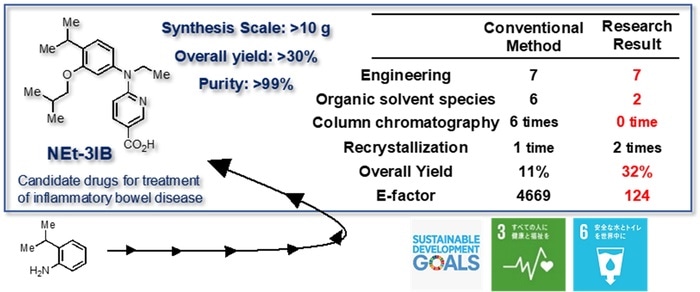Steroids and antibody drugs are currently used to treat inflammatory bowel disease (IBD), which is characterized by chronic inflammation of the digestive tract. Steroids, on the other hand, have adverse effects such as delayed healing, and antibody drugs are highly-priced. Small-molecule drugs are both inexpensive and simple to use. A new small-molecule oral drug is critical to achieving the SDG of “health and well-being for all.”

The new synthesis technique offers higher yields than conventional methods of synthesis and also succeeded in reducing the use of organic solvents, thus making the overall process more sustainable. Image Credit: Hiroki Kakuta
To that end, a research team led by Associate Professor Hiroki Kakuta of Okayama University in Japan created a new large-scale synthesis technique for the pervasive and steady supply of 4-(ethyl(3-isobutoxy-4-isopropylphenyl)amino)benzoic acid, also known as “NEt-3IB,” a promising drug candidate for IBD.
Yuta Takemura, Ken-ichi Morishita, Shota Kikuzawa, and Masaki Watanabe, all from Okayama University, completed the research team. Their findings were published in the journal Chemical and Pharmaceutical Bulletin. On February 1st, 2022, the paper was released online.
We have successfully developed new method of method for mass-synthesizing environmentally friendly NEt-3IB with a 35-fold better E-factor—an indicator of the environmental burden in multistage drug substance synthesis—than conventional processes.”
Hiroki Kakuta, Associate Professor, Okayama University
Dr Kakuta also explains, “The synthesis of NEt-3IB so conventionally uses column chromatography, which requires a large amount of organic solvents in addition to three organic solvents that are not recoverable for reaction,” describing the motivation behind their study.
“In order to achieve carbon neutrality and meet sustainable development goals (SDGs), we were driven to avoid column chromatography and find approaches with recoverable organic solvents,” Dr Kakuta adds.
With this in mind, the researchers investigated traditional chemical synthesis methods and devised a new approach that relies solely on fat-soluble ether and alcohol. This modification drastically decreased the volume of liquid waste while also making it easily recyclable.
Purification of the resulting NEt-3IB by recrystallization demonstrated that this new synthesis process was able to produce large amounts of NEt-3IB with a total yield of more than 30% and a purity of 99%.
Our method provides an example of an approach that employs recoverable solvents and takes a step towards carbon neutrality. This approach can be applied for the production of not only NEt-3IB, but also other small molecule pharmaceuticals.”
Hiroki Kakuta, Associate Professor, Okayama University
In a similar manner, the contamination of reaction kilns or “batches” by foreign substances has resulted in a slew of drug recalls around the world in recent years. This has sparked worldwide interest and a paradigm shift from batch to flow synthesis.
This study’s large-scale flow method of synthesis for NEt-3IB includes a simple purifying phase and decreases the amount of organic solvent species used throughout the process.
With these distinct advantages, the newly developed process is likely to serve as a stepping stone toward the complete continuous-flow synthesis of active pharmaceutical ingredients, abbreviated as “APIs.”
Dr Kakuta explains, “We are going to launch clinical trials this year using NEt-3IB synthesized via the environment-friendly method. We hope to find a new treatment for IBD within a few years.”
Meanwhile, there is hope that the research team is able to achieve its goal of helping people with IBD soon. This can also be considered as a reminder for reducing individual carbon footprints!
Source:
Journal reference:
Takamura, Y., et al. (2022) Development of Scaled-Up Synthetic Method for Retinoid X Receptor Agonist NEt-3IB Contributing to Sustainable Development Goals. Chemical and Pharmaceutical Bulletin. doi.org/10.1248/cpb.c21-00911.